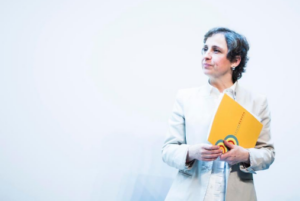Renowned Mexican journalist Carmen Aristegui and her team at Aristegui Noticias have done it again. Her audience went to sleep the evening of April 27 with the publication of an investigation that says a massive leak reveals a covert operation of the world’s largest Spanish-language video content producer, Televisa, to fabricate news and destroy reputations.
The leak, as explained by the Aristegui Noticias team, consists of more than 5 terabytes of internal communications, including “videos, photos, chats, editable files, instructions, and scripts that resulted in smear campaigns orchestrated from the headquarters of the television company.” The volume of information analyzed resembles the Sedena Leaks or double the amount of the Panama Papers leak.
The investigation says documents show the online company Metrics Index, known for running smear campaigns, had office space inside Televisa’s facilities near downtown Mexico City, where it worked with Televisa employees to fabricate false information and spread attacks against competitors.
The team known as “Palomar” was led by the political analyst Javier Tejado Dondé, and the highest-level executives of the television company were aware of its existence, according to the investigation.
“Other Televisa executives such as Rubén Acosta Montoya, Director of Media for Mexico and Latin America at TelevisaUnivision, and Dora Alicia Martínez Valero, who at the time was the General Director of Electoral Affairs at Grupo Televisa and is now a candidate for minister of the Supreme Court of Justice of the Nation, also received the information and products generated by ‘Palomar,’” according to one of the reports.
According to the article, “Arturo Zaldívar, another star for Televisa,” one of Palomar’s clandestine operations was a social media campaign that boosted the then-Justice Arturo Zaldívar to the presidency of Mexico’s Supreme Court—the highest post in the federal judiciary—for the 2019–2022 term.
In return, Televisa was awarded two public contracts exceeding USD $3 million, the investigation found. Among them was the filming of a documentary, the article said.

Renowned Mexican journalist Carmen Aristegui was also a target of Palomar’s attacks (Photo: Erick Vega)
The investigation says the campaign went so far that the son of a judge who issued unfavorable rulings for Zaldívar and the government of then-President Andrés Manuel López Obrador was accused on social media of alleged sexual assault and school bullying against a female classmate. False video testimonies were fabricated and acted out by Televisa employees themselves.
According to another article, the Palomar team was also tasked with discrediting the television company’s “enemies,” among them the billionaire Carlos Slim, Mexico’s richest man.
The investigation says Televisa paid to promote a series of social media posts in 2021 blaming Slim’s companies for the collapse of Line 12 of the Mexico City metro. Also through fake accounts and pages, they accused Slim of wanting to privatize the top division of the Mexican soccer league. This, the Aristegui Noticias report says, was done with the intention of securing broadcasting rights for the national team.
Aristegui herself was also a target of Palomar’s attacks. Her name appears about 300 times in leaked Telegram conversations.
According to one of the reports published from the leak, the Televisa team constantly monitored the journalist’s program as well as the Aristegui Noticias website. If any publication or interview affected the television company’s interests, they would unleash their army of bots, manipulate images, or fabricate video montages.
“Aristegui Noticias has not hesitated to shine a light on the controversies and scandals that have marked Televisa over the years, which has made this news outlet one of the targets of the television company’s dirty war,” says the special investigations unit of Aristegui Noticias.
This is not the first time that Aristegui’s investigative team has shaken the foundations of power. In 2014, they published the report “The White House of Enrique Peña Nieto,” an investigation into the ownership of a luxurious mansion linked to the presidential family.
For more than a year, journalists collected public documents and cross-referenced information about the private and political lives of then-President Peña Nieto and his wife Angélica Rivera, revealing connections between the government and Grupo Higa, a company that had been receiving contracts since Peña Nieto was governor of Mexico State and that also financed and built the so-called “White House” in one of the toniest areas of the country.
The revelation triggered a severe credibility crisis for the Mexican government, as it directly implicated the president and his family in alleged acts of corruption and conflict of interest.
In 2016, another Aristegui Noticias investigation revealed that Peña Nieto had plagiarized at least ten authors in his undergraduate thesis in law at the Universidad Panamericana.
A group of specialists analyzed the document and found that a significant portion of the content had been copied without crediting the original sources. The outlet directly verified the books and documents cited, confirming that Peña Nieto copied 197 out of the 682 paragraphs that make up the thesis, which represented nearly a third of the text.